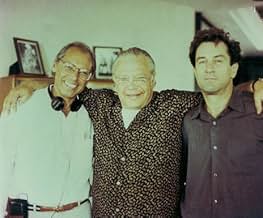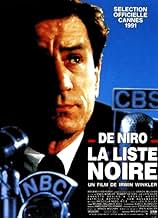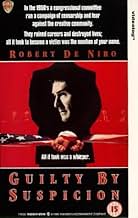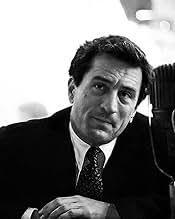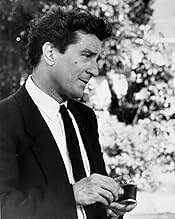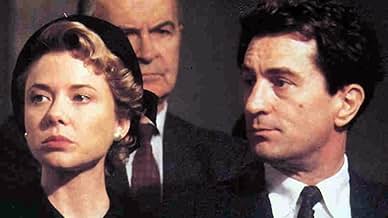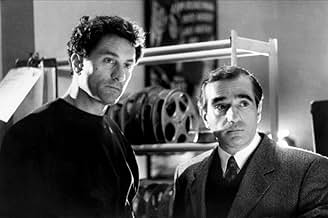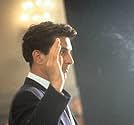AVALIAÇÃO DA IMDb
6,5/10
10 mil
SUA AVALIAÇÃO
Retornando a Hollywood em 1951, depois de trabalhar na França, um diretor de cinema enfrenta o macartismo de frente.Retornando a Hollywood em 1951, depois de trabalhar na França, um diretor de cinema enfrenta o macartismo de frente.Retornando a Hollywood em 1951, depois de trabalhar na França, um diretor de cinema enfrenta o macartismo de frente.
- Prêmios
- 2 vitórias e 2 indicações no total
Roxann Dawson
- Felicia Barron
- (as Roxann Biggs)
Avaliações em destaque
This is a fairly good movie. It provides a compelling dramatic struggle and captures the paranoia of an era. However, like many Hollywood movies, it strives more to create a dramatic story than an accurate one.
This movie was originally to be based on the life of blacklisted writer/director Abraham Polonsky (Force of Evil, Body and Soul). Polonsky was working in France at the time of the HUAC hearings and a friend called to tell him not to come back or he'd be called to testify. He deliberately came back for the express purpose of telling HUAC where they could stick it. This is a good story as an anecdote, but not a great story for a movie.
The one place in which this movie (and many other movies) softens the history is by making the protagonist politically neutral. It is certainly true that many people accused were not communists or had only attended a meeting out of curiosity, but this is not true for everybody. Many of these people were devout socialists. As Polonsky has said on occasion "During the Great Depression, anybody with a brain considered Communism. The Capitalist system was BROKE. Communism looked like a smart bet." While many of these people reconsidered as the nation returned to prosperity, a large number did not.
Most of the famous Hollywood Ten were still believers in socialism when they were blacklisted. There is no evidence that any of them were spies for the Soviet Union-- many of them had already learned that the USSR was not the socialist paradise they dreamed of-- but they did believe in the writings of Mark and Engels. It is also true that they placed socialist themes in their films. They created gangsters who only cared about money, families screwed over by greedy real estate brokers and poor saps who put it all in the stock market.
However, none of this was illegal. They had every right to believe in whatever politics they chose to. They had every right to create these films-- and their movies seemed to have a resonance with the audience. They're lives and careers were destroyed because they held political beliefs that some viewed as threatening.
I also want to point out that Elia Kazan was not the model for this film. Elia Kazan has been repeatedly condemned by Polonsky and others who were blacklisted. He chose to name names and to allow the HUAC to bully him. I don't condemn him for this like other people. As this movie shows, so much was on the line for people who HUAC sets their sights on. Kazan cracked. He failed to be a hero, when the time came. This doesn't mark him a coward, merely something less than a hero. "On the Waterfront," while not a direct explanation of his actions, is an excellent look at his state of mind around that time.
While yes, I have not spent much time reviewing this movie, I felt it necessary to set the record straight about history.
This movie was originally to be based on the life of blacklisted writer/director Abraham Polonsky (Force of Evil, Body and Soul). Polonsky was working in France at the time of the HUAC hearings and a friend called to tell him not to come back or he'd be called to testify. He deliberately came back for the express purpose of telling HUAC where they could stick it. This is a good story as an anecdote, but not a great story for a movie.
The one place in which this movie (and many other movies) softens the history is by making the protagonist politically neutral. It is certainly true that many people accused were not communists or had only attended a meeting out of curiosity, but this is not true for everybody. Many of these people were devout socialists. As Polonsky has said on occasion "During the Great Depression, anybody with a brain considered Communism. The Capitalist system was BROKE. Communism looked like a smart bet." While many of these people reconsidered as the nation returned to prosperity, a large number did not.
Most of the famous Hollywood Ten were still believers in socialism when they were blacklisted. There is no evidence that any of them were spies for the Soviet Union-- many of them had already learned that the USSR was not the socialist paradise they dreamed of-- but they did believe in the writings of Mark and Engels. It is also true that they placed socialist themes in their films. They created gangsters who only cared about money, families screwed over by greedy real estate brokers and poor saps who put it all in the stock market.
However, none of this was illegal. They had every right to believe in whatever politics they chose to. They had every right to create these films-- and their movies seemed to have a resonance with the audience. They're lives and careers were destroyed because they held political beliefs that some viewed as threatening.
I also want to point out that Elia Kazan was not the model for this film. Elia Kazan has been repeatedly condemned by Polonsky and others who were blacklisted. He chose to name names and to allow the HUAC to bully him. I don't condemn him for this like other people. As this movie shows, so much was on the line for people who HUAC sets their sights on. Kazan cracked. He failed to be a hero, when the time came. This doesn't mark him a coward, merely something less than a hero. "On the Waterfront," while not a direct explanation of his actions, is an excellent look at his state of mind around that time.
While yes, I have not spent much time reviewing this movie, I felt it necessary to set the record straight about history.
I consider this period of the early 90's to be Robert DeNiro's second wind, if you will, after many great films he starred in the 70's. This film, along with the excellent Goodfellas, Awakenings, Night and the City, A Bronx Tale, and Cape Fear highlighted a great actor's resume. He hasn't done many great films in a while, but his acting chops speak for themselves. He stars here as David Merrill, a blacklisted director in Hollyweird, who's basically accused of being a communist and certain government factions want him to name names. His performance, although subdued, is very solid as he struggles with the decision to either report his friends, who are thought to be Communist in order to rescue his once promising career, or refuse to give up any names so their lives and careers won't be destroyed also. There's a moving scene between Merrill and congress as they bombard him with questions and accusations. This is probably the most memorable scene, but I thought it tries to wrap the film up in a neat little ball, as opposed to letting us know exactly what went on in those supposedly communist meetings Merrill was a part of, and what was discussed there and who attended these meetings.
George Wendt does a commendable job as Bunny Baxter, even though it's difficult to see him other than Norm from Cheers, but I digress. Annette Benning and Patricia Wettig also give solid performances in this forgotten little film based on a true story.
George Wendt does a commendable job as Bunny Baxter, even though it's difficult to see him other than Norm from Cheers, but I digress. Annette Benning and Patricia Wettig also give solid performances in this forgotten little film based on a true story.
It's almost impossible to write any kind of objective film about the blacklist, the wounds of it run deep in show business. Guilty By Suspicion has no pretense to objectivity, neither does that John Wayne epic Big Jim McLain which was favorable to the House Un American Activities Committee.
Those who gave testimony at HUAC did so for a variety of motives. Some like Adolphe Menjou wanted the blacklist for everyone to the left of Herbert Hoover. Some like Robert Taylor felt they were doing a patriotic service. Some under the threat of not being able to work as artists in their chosen profession named names before HUAC. A very select few said stick it in your ear.
If there any guilty parties it's not the artists whatever their political persuasion. It was the studio bosses and one of them, Darryl F. Zanuck is played here by Ben Piazza, who gave in without exception to HUAC and cooperated in the blacklist, who pitted the people of various political persuasions against each other. Sad to say that's not really demonstrated here in Guilty By Suspicion.
The members of HUAC were 95% on the political right of both parties. The Democrats were mostly southerners and the Republicans were on the right in their party. The liberals of either party had more constructive ways to spend their time in Congess.
Guilty By Suspicion tells the story of Robert DeNiro as a fictional film director who gets blacklisted because of secret hearing testimony given by Chris Cooper. His struggle to find work turns positively Kafkaesque until he agrees to go before the committee.
DeNiro strikes all the right notes in his performance and is aided and abetted by the performance of Annette Bening as his estranged wife. Acting honors however go to Patricia Wettig who plays a distraught blacklisted actress with a drinking problem to start with.
Guilty By Suspicion is not the ultimate telling of the blacklist's story, but it's still pretty good and does get a feel for the times the story is set in.
Those who gave testimony at HUAC did so for a variety of motives. Some like Adolphe Menjou wanted the blacklist for everyone to the left of Herbert Hoover. Some like Robert Taylor felt they were doing a patriotic service. Some under the threat of not being able to work as artists in their chosen profession named names before HUAC. A very select few said stick it in your ear.
If there any guilty parties it's not the artists whatever their political persuasion. It was the studio bosses and one of them, Darryl F. Zanuck is played here by Ben Piazza, who gave in without exception to HUAC and cooperated in the blacklist, who pitted the people of various political persuasions against each other. Sad to say that's not really demonstrated here in Guilty By Suspicion.
The members of HUAC were 95% on the political right of both parties. The Democrats were mostly southerners and the Republicans were on the right in their party. The liberals of either party had more constructive ways to spend their time in Congess.
Guilty By Suspicion tells the story of Robert DeNiro as a fictional film director who gets blacklisted because of secret hearing testimony given by Chris Cooper. His struggle to find work turns positively Kafkaesque until he agrees to go before the committee.
DeNiro strikes all the right notes in his performance and is aided and abetted by the performance of Annette Bening as his estranged wife. Acting honors however go to Patricia Wettig who plays a distraught blacklisted actress with a drinking problem to start with.
Guilty By Suspicion is not the ultimate telling of the blacklist's story, but it's still pretty good and does get a feel for the times the story is set in.
The film Guilty by Suspicion showed the effects of the Hollywood blacklist in true-to-life form. Not only did it deal with how friendships and families were affected during this period, but it also showed how other American's, such as teachers, were also blacklisted. Blacklisting was not only a Hollywood occurrence.
Those interested in communism in Hollywood will find the screenplay exciting and interesting, as there are hints of actual transcripts from the House Committee on Un-American Activities scattered throughout the movie. I've watched it at least three times, and I never get bored, I just pick up more and more of the realities of this time period.
The movie is not meant to be used as a way to research this time period. It is a statement movie. It is a statement about the evilness of the red scare. It is not pro-communist, but it is pro American freedom of expression.
Guilty by Suspicion is a great educational movie that is supported by a great cast, and great subplots!
Those interested in communism in Hollywood will find the screenplay exciting and interesting, as there are hints of actual transcripts from the House Committee on Un-American Activities scattered throughout the movie. I've watched it at least three times, and I never get bored, I just pick up more and more of the realities of this time period.
The movie is not meant to be used as a way to research this time period. It is a statement movie. It is a statement about the evilness of the red scare. It is not pro-communist, but it is pro American freedom of expression.
Guilty by Suspicion is a great educational movie that is supported by a great cast, and great subplots!
Director David Merrill (Robert De Niro) returns from filming in France to find the country over-run by the Red Scare. People are all taking loyalty oaths. The House Committee on Un-American Activities is hunting for Communists. Bunny Baxter (George Wendt) is his writer best friend. Actress friend Dorothy Nolan (Patricia Wettig) is struggling after her husband named names. David's married to Ruth (Annette Bening) with a young son. Friendships and marriages are breaking apart as tension rises. With his work on the line, Merrill is also pushed to name names as others acquiesce.
It's a sincere telling of a fictional Red Scare story with some of the real players in the real history of the Un-American Activities Committee. It's very sincere but not the most thrilling drama. The actors are first rate. Despite the good work, there are no surprises and nothing too dramatic. It feels more or less melodramatic. This is one movie where a based on true story would be useful.
It's a sincere telling of a fictional Red Scare story with some of the real players in the real history of the Un-American Activities Committee. It's very sincere but not the most thrilling drama. The actors are first rate. Despite the good work, there are no surprises and nothing too dramatic. It feels more or less melodramatic. This is one movie where a based on true story would be useful.
Você sabia?
- CuriosidadesMartin Scorsese portrays a fictional director called "Joe Lesser". This character is based on director Joseph Losey, who left Hollywood in the 1950s rather than face the HUAC examinations.
- Erros de gravaçãoThere is a Milwaukee Braves baseball pennant on the wall of Merrill's son's room. This film takes place in 1951 and 1952. The Braves didn't move to Milwaukee from Boston until 1953.
- Citações
David Merrill: [to the Blacklist Committee] Fuck them!
- Trilhas sonorasStraighten Up and Fly Right
Written by Nat 'King' Cole and Irving Mills
Performed by Nat 'King' Cole
Courtesy of Capitol Records, Inc.
By arrangement with CEMA Special Markets
Principais escolhas
Faça login para avaliar e ver a lista de recomendações personalizadas
- How long is Guilty by Suspicion?Fornecido pela Alexa
Detalhes
- Data de lançamento
- País de origem
- Idioma
- Também conhecido como
- Culpable por sospecha
- Locações de filme
- Empresas de produção
- Consulte mais créditos da empresa na IMDbPro
Bilheteria
- Orçamento
- US$ 13.000.000 (estimativa)
- Faturamento bruto nos EUA e Canadá
- US$ 9.480.198
- Fim de semana de estreia nos EUA e Canadá
- US$ 2.278.290
- 17 de mar. de 1991
- Faturamento bruto mundial
- US$ 9.480.198
- Tempo de duração
- 1 h 45 min(105 min)
- Cor
- Mixagem de som
- Proporção
- 1.85 : 1
Contribua para esta página
Sugerir uma alteração ou adicionar conteúdo ausente


